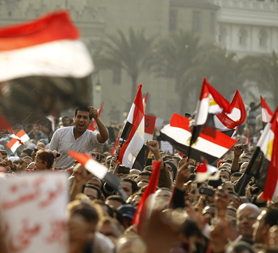Egypt releases political prisoners, as Tahrir shuns pop star
The Egyptian government has released 34 political prisoners, including members of the Muslim Brotherhood, as the country’s biggest pop star is shunned in Tahrir Square.

Another one thousand or so other prisoners were also released on Wednesday after completing at least three-quarters of their sentences.
A state-owned agency said: “Interior Minister Mahmoud Wagdy issued an order today releasing 34 political detainees considered to be among the extremist elements, after evaluating their positions.
“They showed good intentions and expressed their desire to live peaceably with society.”
Thousands of protesters remained in Tahrir Square on Wednesday and hundreds of government employees and university professors staged separate protests demanding better pay and conditions outside state buildings in the capital of Cairo.
Channel 4 News International Editor Lindsey Hilsum tweeted: “A thousand or so outside parliament. Blankets being brought in so people can camp out overnight.
“Soldiers outside very friendly. A General there this morning was hugging protestors.”
Meanwhile, in the western province of New Valley, a protester was killed and several suffered gunshot wounds after clashes erupted between security forces and around 3,000 protesters.
Suez saw a few thousand workers from three state-owned companies – two petroleum firms and one of the Suez Canal zone companies – protested asking for higher pay. A senior official has said the action would not affect canal operations.
As the protests raged on what is the 16th day of protests in the country, analysts at Credit Agricole bank estimate the crisis is costing Egypt £193 million a day.
Channel 4 News reported on Tuesday that several high-profile public figures in Egypt, who had previously spoken in support of Mubarak, were now backing the anti-Government protesters.
One of those was Tamer Hosni, who is often referred to as the Arabic World’s biggest pop star and is also Egypt’s highest-grossing actor.
The author of the influential Cairo-based blog, Egyptian Chronicles, had told Channel 4 News: “Egypt’s famous pop idol Tamer Hosni…was speaking about his ‘father Mubarak’ last week and yesterday he claimed that he was deceived by official media and even made a song about revolution.”
But on Thursday, Hosni broke down in tears on a YouTube video (above) after he was booed and heckled after making an appearance in Tahrir Square.

According to reports, he attempted to address the crowd in Tahrir Square, but people shouted him down and the army had to fire warning shots in the air.
He had been seeking to apologise for not backing the anti-government protests and their efforts to peacefully topple the country’s president.
He is alleged to have urged the protesters to leave Tahrir Square last week, saying Mubarak had offered them concessions.
“I want to die today. I am not angry with them (protesters). They misunderstood that. They told me go and save the country. I thought I was saving the people,” Hosni says in the video after being ushered away from Tahrir.
One group of university students demonstrating in Tahrir Square added another line to the slogan, “the people want the fall of the government.” Theirs read:”‘the people want the fall of the government… and Tamer Hosny.’
And on the day that pop star Hosni fell from grace in the eyes of the Egyptian public, it was the name of Google executive Wael Ghonim, who was released fom prison on Monday after spending 12 days blindfolded, that resounded across the country.
'Humiliated' Egyptians fight for dignity and justice
I nearly tripped over the plump man lying on the pavement, wirtes International Editor Lindsey Hilsum.
Hidden beneath a blanket, he was snoring loudly as his comrades marched up and down outside Egypt's parliament shouting anti government slogans. I guess that after 15 days and nights of protest, he could have slept through anything.
But this camp on the street between the People's Assembly and the Prime Minister's Office is a new front in the unfinished revolution. Until now, the demonstrators have confined themselves to Tahrir Square.
Mohammed el Nagdy was standing right in front of the main gate to Parliament, his wife and three children sitting on the ground at one side. Two days ago, they travelled from Damietta, an industrial town about a hundred miles north of Cairo, where he works in a furniture factory.
"At the beginning this was very personal," he said. "All my life I have been beaten and humiliated in police stations. This was how it started for me. But I was surprised that the young people took this action. First I went to Tahrir Square but last night I decided to come here because I heard that there are changes in the constitution to be decided here in the People's Assembly. We don't accept the legality of this place anymore. When you have a revolution, the constitution no longer applies."
His wife, Rania Fouad, clad head to toe in black, added: "I am one of those who was exposed to injustice personally. I lost my dignity, my pride. I was humiliated in my own country. The least I can do is come here to express my feelings."
She was reluctant to tell her story, but it's well known that one way the police get confessions from men suspected of being part of the banned Muslim Brotherhood is to bring their wives to prison and threaten to remove their clothes, or sexually harass them. I suspect that's what happened to Mohammed and Rania.
Read more on the World News Blog